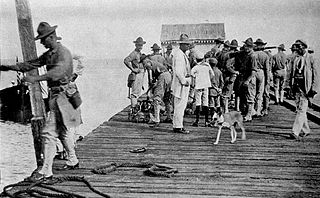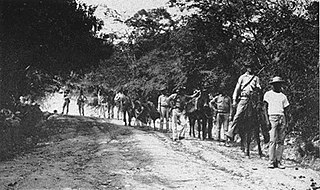 W
WThe first United States occupation of the Dominican Republic lasted from 1916 to 1924. It was one of the many interventions in Latin America undertaken by the military forces of the United States in the 20th century. On the 13 May 1916, Rear Admiral William B. Caperton forced the Dominican Republic's Secretary of War Desiderio Arias, who had seized power from Juan Isidro Jimenes Pereyra, to leave Santo Domingo by threatening the city with naval bombardment.
 W
WThe Banana Wars were occupations, police actions, and interventions on the part of the United States in Central America and the Caribbean between the end of the Spanish–American War in 1898 and the inception of the Good Neighbor Policy in 1934. These military interventions were most often carried out by the United States Marine Corps, which developed a manual, The Strategy and Tactics of Small Wars (1921) based on its experiences. On occasion, the Navy provided gunfire support and Army troops were also used.
 W
WThe Dominican Civil War took place between April 24, 1965, and September 3, 1965, in Santo Domingo, Dominican Republic. It started when civilian and military supporters of former President Juan Bosch overthrew acting President Donald Reid Cabral. The coup prompted General Elías Wessin y Wessin to organize elements of the military loyal to President Reid ("loyalists"), initiating an armed campaign against the so-called constitutionalist rebels. Allegations of foreign support for the rebels led to a United States intervention in the conflict, which later transformed into an Organization of American States occupation of the country. Elections were held in 1966, in the aftermath of which Joaquín Balaguer was elected into the presidential seat. Later in the same year international troops departed from the country.
 W
WThe Dominican Independence War gave the Dominican Republic autonomy from Haiti on February 27, 1844. Before the war, the island of Hispaniola had been united under the Haitian government for a period of 22 years when the newly independent nation, previously known as the Captaincy General of Santo Domingo, was unified with Haiti in 1822. The criollo class within the country overthrew the Spanish crown in 1821 before unifying with Haiti a year later.
 W
WThe Iraq War was a protracted armed conflict that began in 2003 with the invasion of Iraq by a United States-led coalition that overthrew the government of Saddam Hussein. The conflict continued for much of the next decade as an insurgency emerged to oppose the occupying forces and the post-invasion Iraqi government. An estimated 151,000 to 1,033,000 Iraqis were killed in the first three to four years of conflict. US troops were officially withdrawn in 2011. However, following the spread of the Syrian Civil War and the territorial gains of the Islamic State of Iraq and the Levant (ISIL), the Obama administration decided to redeploy US forces to Iraq in 2014. Many former soldiers are employed by defense contractors and private military companies. The U.S. became re-involved in 2014 at the head of a new coalition; the insurgency and many dimensions of the civil armed conflict continue. The invasion occurred as part of the George W. Bush administration's War on Terror, following the September 11 attacks.
 W
WThe Six Years' War was a civil war in the Dominican Republic that "constituted the third war of independence fought by the Dominican people", in this case against the administration of President Buenaventura Báez, which in 1869 negotiated the Dominican Republic's annexation to the United States. According to the Dominican intellectual Pedro Henríquez Ureña, this war was a critical phase in the creation of Dominican national consciousness because, having already differentiated themselves from the Haitians in the first war of independence and the Spaniards in the second, the Dominicans asserted their incompatibility with the United States.
 W
WWorld War II, also known as the Second World War, was a global war that lasted from 1939 to 1945. It involved the vast majority of the world's countries—including all the great powers—forming two opposing military alliances: the Allies and the Axis. In a state of total war, directly involving more than 100 million people from more than 30 countries, the major participants threw their entire economic, industrial, and scientific capabilities behind the war effort, blurring the distinction between civilian and military resources. World War II was the deadliest conflict in human history, marked by 70 to 85 million fatalities. Tens of millions of people died due to genocides, premeditated death from starvation, massacres, and disease. Aircraft played a major role in the conflict, including in the use of strategic bombing of population centres, and the only uses of nuclear weapons in war.